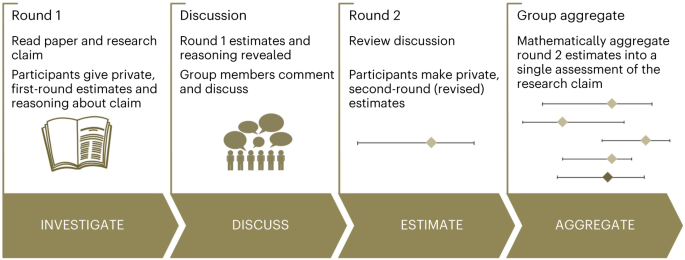Predicting the replicability of social and behavioural science claims in COVID-19 preprints
IF 21.4
1区 心理学
Q1 MULTIDISCIPLINARY SCIENCES
引用次数: 0
Abstract
Replications are important for assessing the reliability of published findings. However, they are costly, and it is infeasible to replicate everything. Accurate, fast, lower-cost alternatives such as eliciting predictions could accelerate assessment for rapid policy implementation in a crisis and help guide a more efficient allocation of scarce replication resources. We elicited judgements from participants on 100 claims from preprints about an emerging area of research (COVID-19 pandemic) using an interactive structured elicitation protocol, and we conducted 29 new high-powered replications. After interacting with their peers, participant groups with lower task expertise (‘beginners’) updated their estimates and confidence in their judgements significantly more than groups with greater task expertise (‘experienced’). For experienced individuals, the average accuracy was 0.57 (95% CI: [0.53, 0.61]) after interaction, and they correctly classified 61% of claims; beginners’ average accuracy was 0.58 (95% CI: [0.54, 0.62]), correctly classifying 69% of claims. The difference in accuracy between groups was not statistically significant and their judgements on the full set of claims were correlated (r(98) = 0.48, P < 0.001). These results suggest that both beginners and more-experienced participants using a structured process have some ability to make better-than-chance predictions about the reliability of ‘fast science’ under conditions of high uncertainty. However, given the importance of such assessments for making evidence-based critical decisions in a crisis, more research is required to understand who the right experts in forecasting replicability are and how their judgements ought to be elicited. This study assessed COVID-19 social science preprints’ replicability using structured groups. Both beginners and more-experienced participants used a elicitation protocol to make better-than-chance predictions about the reliability of research claims under high uncertainty.


预测COVID-19预印本中社会和行为科学主张的可复制性
重复对评估已发表研究结果的可靠性很重要。然而,它们是昂贵的,而且复制一切是不可行的。准确、快速、低成本的替代方案,如诱导预测,可以加快危机中快速政策实施的评估,并有助于指导更有效地分配稀缺的复制资源。我们使用交互式结构化引出方案从参与者中引出关于新兴研究领域(COVID-19大流行)的预印本中的100条主张的判断,并进行了29次新的高强度重复。在与同伴互动后,任务专长较低的参与者群体(“初学者”)比任务专长较高的参与者群体(“有经验的”)更能更新他们的估计和对自己判断的信心。对于有经验的个体,交互后的平均准确率为0.57 (95% CI:[0.53, 0.61]),他们正确分类了61%的索赔;初学者的平均准确率为0.58 (95% CI:[0.54, 0.62]),正确分类了69%的索赔。两组之间的准确性差异无统计学意义,他们对全套索赔的判断是相关的(r(98) = 0.48, P < 0.001)。这些结果表明,使用结构化过程的初学者和更有经验的参与者都有能力在高度不确定性的条件下对“快速科学”的可靠性做出比偶然更好的预测。然而,考虑到这种评估对于在危机中做出基于证据的关键决策的重要性,需要更多的研究来了解谁是预测可复制性的合适专家,以及应该如何得出他们的判断。
本文章由计算机程序翻译,如有差异,请以英文原文为准。
求助全文
约1分钟内获得全文
求助全文
来源期刊

Nature Human Behaviour
Psychology-Social Psychology
CiteScore
36.80
自引率
1.00%
发文量
227
期刊介绍:
Nature Human Behaviour is a journal that focuses on publishing research of outstanding significance into any aspect of human behavior.The research can cover various areas such as psychological, biological, and social bases of human behavior.It also includes the study of origins, development, and disorders related to human behavior.The primary aim of the journal is to increase the visibility of research in the field and enhance its societal reach and impact.
 求助内容:
求助内容: 应助结果提醒方式:
应助结果提醒方式:


